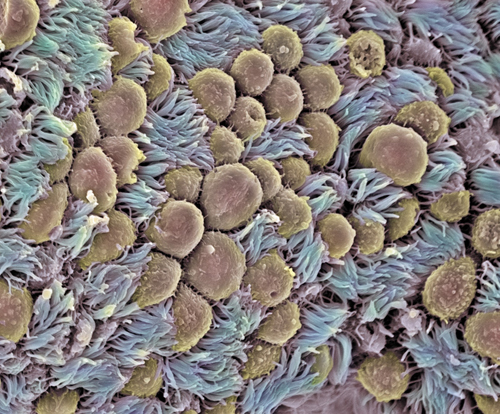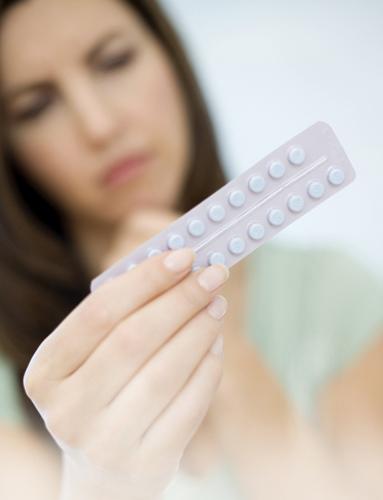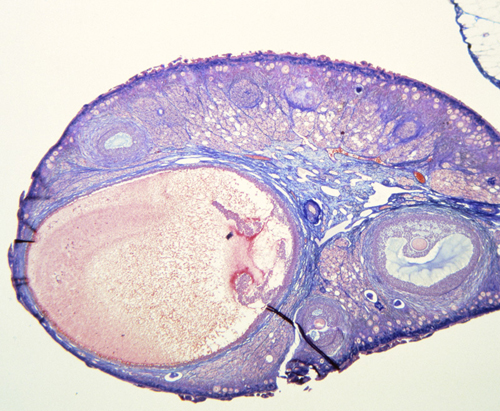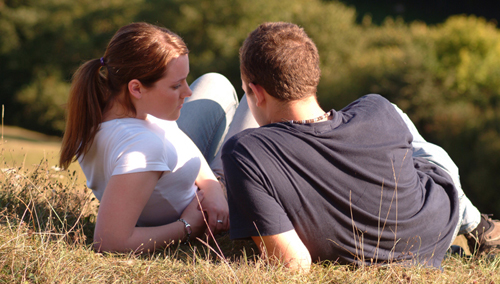This is Day 10 of your Menstrual Cycle 270 days to go…
You may not care whether you have a boy or a girl, but according to some theories you can influence gender.
What’s happening inside
As ovulation approaches, more cervical mucus is produced. Here
it has crystallized to form a “fern leaf” pattern. Around the time of
ovulation the mucus becomes clear, slippery, and stretchy, which makes
it easier for sperm to swim through.

Conceiving is all about having sex at the right time
this week, but if you’re hoping to have a child of a specific gender,
the timing could be even more important. Some experts claim there is a
link between when you have sex and the baby’s gender.
Recent research
suggests that women who have a high calorie intake (especially if they
eat that most phallic of fruit, the banana) are marginally more likely
to bear a boy. Those who skip breakfast or have a low calorie intake are
more likely to have a girl. One reason for this is thought to be that
the extra calories consumed affect vaginal secretions and help to give
the Y sperm that makes baby boys a vital boost.
Research has found that women with high glucose levels, achieved by eating normally and not skipping breakfast, were more likely to conceive a boy.

Making babies… boys and girls
The Shettles method,
devised by Dr. Landrum Shettles, is based on the fact that Y sperm (for
boys) are smaller, faster, and less resilient than X sperm (for girls),
and are less able to withstand an acidic environment in the vagina.
The Whelan method,
devised by Dr. Elizabeth Whelan, suggests that having sex earlier on in
the cycle, some four to six days before ovulation, is more likely to
result in a boy. Sex nearer the time of ovulation is more likely to
result in a girl. Curiously, the Whelan way is more or less the opposite
of the advice given by Shettles.
But what works? The mainstream medical view, supported by reports in journals such as the New England Journal of Medicine,
is that the timing of sex has little or no bearing on gender. The
possible exception is that having sex two days before ovulation may be
slightly more likely to favor a girl.
To conceive a boy, the Shettles method advises:
Timing sex as close to ovulation as possible and adopting positions such as rear-entry that promote deep penetration.
The woman should orgasm, ideally at the same time as the man to make the vagina less acidic and favor Y sperm.
Drinking a cup or two or strong coffee just before sex to give Y-sperm an added kick.
If you already have two same-sex children, you’re 75 percent more likely to conceive a child of that sex again.
Although the sex of the
baby conceived is random, conceiving children of the same sex could be
due to the fact that some men produce better quality X sperm, which
makes baby girls, or Y sperm, which makes baby boys.
Statistically, couples who have two children of different sexes are less likely to try for a third child.
This is Day 11 of your Menstrual Cycle 269 days to go…
If this isn’t the first month you’ve been trying to conceive, don’t be too disappointed. It’s normal for it to take some time.
What’s happening inside
The lining of the fallopian tube, seen here, has a moist mucous
membrane. This contains cells (brown) that protect the tube’s surface.
The hairlike cilia (blue) move the eggs along the tubes following
ovulation.

Have you been trying for a baby for some time?
It’s hard to face the fact that we don’t always conceive when we want
to. This lack of success may be difficult to handle, especially if
you’re someone who has achieved in other areas of your life.
With reproduction,
there’s a large element of chance. Even for young women at their peak of
fertility, the odds of conceiving in any one cycle are 50–50. It’s not
unusual to try for six months, or even 12 months, without success.
Around 16 percent of couples take over a year to achieve a pregnancy. So
plan for conception over a longer time frame, say 12 months, unless you
have any specific reasons to be concerned about your fertility or your
health in general.
The main exception is if
you are over 30. In this case, see your doctor after trying for about
six months. The first step is likely to be a blood test for you, and a
semen analysis for your partner. However, be reassured that if you are
over 30, you may still get pregnant in the old-fashioned way. The
average time taken for a 39-year-old woman to conceive is 15 months. But
the snag is that if you do end up needing assisted fertility
techniques, it all takes time.
Stopping contraception
You can get pregnant as soon as you stop using some contraception.
When you come off the pill, you might become pregnant in the first month. If you’re not ready yet, use condoms for a month or two.

IUD (coil): you can get pregnant if you have sex in the week before it’s removed since sperm can live 3–5 days.
Pill: assume you’re fertile immediately. Some women seem to be extra fertile after stopping the Pill.
Implants:
fertility can return immediately after removal of the implant, but some
women find it takes longer. Occasionally periods can take three to nine
months to become regular. This suggests that the effects of the hormone
are still lingering, but you may still conceive.
Injections:
irregular bleeding can continue for months, and you may not be able to
conceive for several months either. However, as with implants, it’s
possible to get pregnant before your periods return properly.
IUD or IUS:
you could get pregnant if you have sex in the week before removal of
the IUS system, but because the system contains progesterone, conception
is less likely than with a regular coil (see image).
… Nutritionist
| Q: |
I’ve heard that green tea will help me conceive. Is this true?
|
| A: |
So far, studies on green tea and fertility aren’t conclusive
one way or the other. Overall, it’s likely to benefit your health
without affecting your fertility. However, although green tea has a host
of health benefits, it contains small amounts of caffeine and tannic
acid, both of which have (at least in large quantities) been linked to
fertility problems and an increased risk of miscarriage.
|
This is Day 12 of your Menstrual Cycle 268 days to go…
As your hormone level rises around this stage of your cycle, so might your libido—it seems nature takes care of everything!
What’s happening inside
This mature ovarian follicle contains a fluid-filled cavity
(pale pink) known as the follicular antrum. At this stage, just prior to
ovulation, one follicle has become much larger than the others, and it
is this follicle that will rupture to release an egg.

Estrogen levels are rising and reach their peak today,
based on a 28-day menstrual cycle. The rise in estrogen from the
follicles is what stimulates the release of the LH hormone , which surges about 24 hours before ovulation. FSH
from the pituitary gland starts rising later this week. Progesterone
levels are low. There’s no call for this hormone until the uterus lining
needs to thicken. In fact, high levels would make the cervix hostile to
sperm, so they would have trouble getting through to the uterus and the
fallopian tubes to fertilize the egg.
Women also
produce the male hormone testosterone and this reaches a peak around
ovulation. This hormone is responsible for libido in both sexes so,
hopefully, you and your partner should find you’re both in the mood for
making babies at this time.
… Doctor
| Q: |
I had a miscarriage four weeks ago. Is it safe to try for another baby right away?
|
| A: |
There is no exact advice on when you should try again
following a miscarriage. As a general guide, wait until you’ve had one
menstrual period. This will help to date the pregnancy should you
conceive quickly. However, your doctor may advise otherwise, especially
if your miscarriage was linked with an infection. If you are waiting for
tests because you miscarried, it makes sense to have these first.
You and your
partner may need time to grieve for the lost pregnancy, so it is unwise
to rush into trying to conceive again. Be reassured that the vast
majority of women who had a single miscarriage go on to have a baby.
|
It’s a good idea to talk about and work through your grief together before trying to get pregnant again. Miscarrying can be extremely tough and may put a strain on your relationship.

Being stressed can affect your ability to conceive.
Perhaps it’s no
surprise that nature makes it more difficult to conceive in stressful
circumstances. One reason might be that it reduces the ovary’s response
to the hormone surge at mid-cycle . There is also a link between stress and the failure of fertility treatments, although the exact reason for this isn’t known.